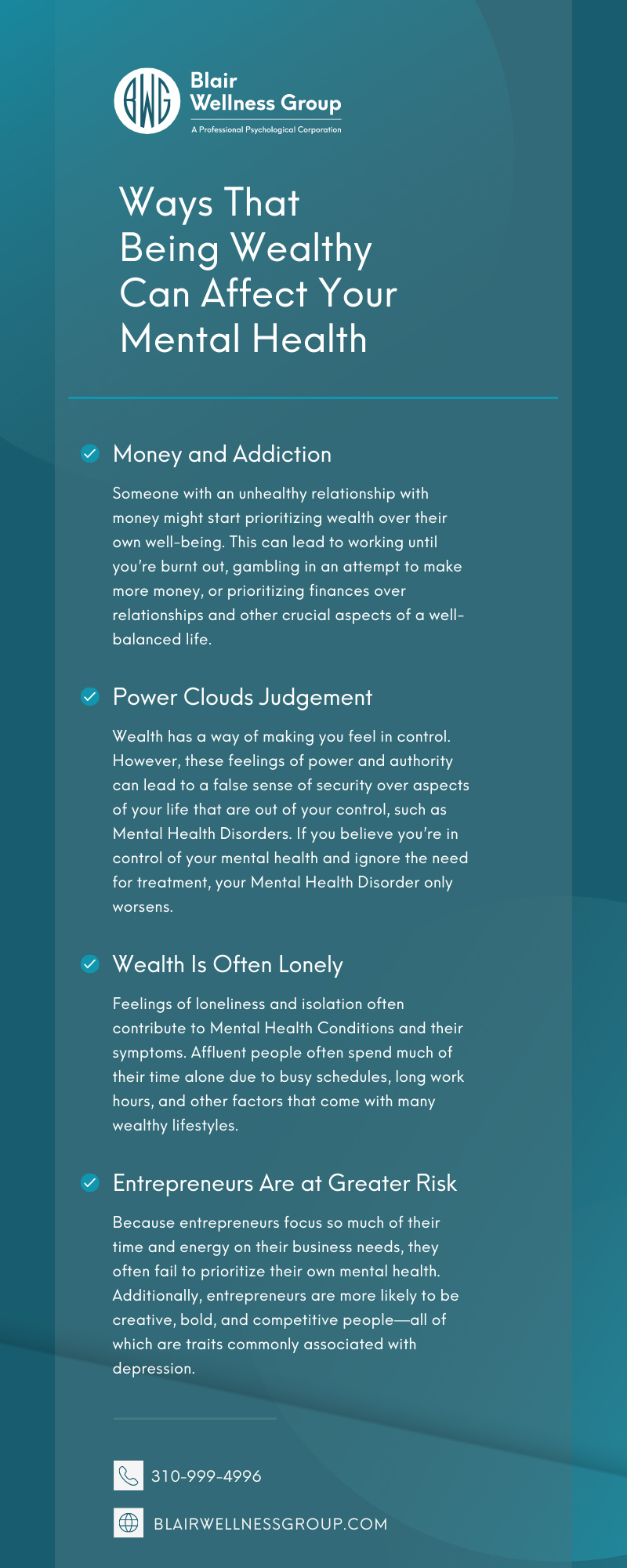Mental health is not an isolated experience. While Mental Health Conditions affect your thoughts and behaviors, they influence—and are influenced by—every aspect of life.
Money is no exception. Wealth and mental health affect each other in unique, often detrimental ways. Money itself can create complications with symptoms or enable maladaptive coping behaviors. Additionally, wealthy people face unique circumstances, pressures, and experiences that can create or exacerbate Mental Health Conditions.
There are several ways that money interacts with and influences your mental well-being. Learn more with our overview of the ways that being wealthy can affect your mental health.
The Misconception of Money and Happiness
Many people believe that wealth equates to happiness. On the surface, it can often seem like that’s true. With money, you can afford both necessities and luxuries. Money allows you to find the care you need to support your physical and mental well-being. Wealthy people also don’t deal with the stress of living paycheck to paycheck.
Understanding that money doesn’t exempt anyone from experiencing mental health issues is crucial. Affluent people face many of the same Mental Health Disorders as everyone else. There are some situations and mental health symptoms that revolve specifically around having wealth. Moreover, those who lead a wealthy lifestyle often feel pressure to be happy because of their finances, which can, in turn, lead to them ignoring any signs of their very real and serious Mental Health Conditions.
Money and Addiction
There are several ways that wealth and addiction influence each other. Like an addiction, the experience of having and making money can consume all parts of your life. Someone with an unhealthy relationship with money might start prioritizing wealth over their own well-being. This can lead to working until you’re burnt out, gambling in an attempt to make more money, or prioritizing finances over relationships and other crucial aspects of a well-balanced life.
Wealth can also fuel addiction. More money means more opportunities to indulge in addictive behaviors or substances. For example, an alcoholic who doesn’t have to worry about finances can easily access any drink they want. As a result, wealth and addiction create a dangerous downward spiral. Individuals spend their money on an addictive substance, thus worsening the Addiction Disorder caused by their wealth in the first place. As money and addiction continue to interact, they create comorbid Mental Health Conditions that exacerbate symptoms and worsen your overall mental well-being.
Power Clouds Judgement
Wealth has a way of making you feel in control. Take your home, for example. While some people spend their entire lives making house payments, wealthy people can pay off mortgages, giving them total control over where they live.
However, these feelings of power and authority can lead to a false sense of security over aspects of your life that are out of your control, such as Mental Health Disorders. If you believe you’re in control of your mental health and ignore the need for treatment, your Mental Health Disorder only worsens. Many affluent people ignore their Mental Health Conditions and don’t seek professional treatment until the issue becomes much more dangerous and severe.
Wealth is Often Lonely
Feelings of loneliness and isolation often contribute to Mental Health Conditions and their symptoms. Affluent people often spend much of their time alone due to busy schedules, long work hours, and other factors that come with many wealthy lifestyles.
As with addiction, loneliness can create a harmful spiral that intensifies your Mental Health Disorder. A wealthy lifestyle can lead to feelings of loneliness that cause your mental health to deteriorate. The worsening symptoms of your Mental Health Disorder can create tension in relationships and cause you to isolate yourself further from friends and family, thus increasing those original feelings of loneliness.
Societal Stigma Around Wealth
Social stigma often keeps individuals from seeking help for their mental health. Affluent people who live with a Mental Health Condition face the same disapproval, shame, and other negative perspectives of mental health as anyone else.
However, wealthy people also face unique stigmas regarding their wealth. Much of society tends to view rich people as evil or apathetic. This judgment can be harmful, and it can lead to feelings of guilt, shame, and other negative thoughts. The stigma around wealth creates extra worry and doubt, making it even more challenging to seek the professional treatment you need for your Mental Health Condition.
Mental Health Affects Finances
Just as there are many ways that being wealthy can affect your mental health, mental health can affect money, too. Mental Health Disorders such as depression can cause you to stop paying attention to finances. You might stop budgeting or putting money into investments or savings accounts. Alternatively, you might turn to harmful financial habits—such as overspending or gambling—as a maladaptive coping mechanism. Severe mental illness can also put a strain on your professional life, causing you to lose motivation and potentially lose your job as a result.
Entrepreneurs Are at Greater Risk
While all wealthy individuals can experience Mental Health Conditions, entrepreneurs, business owners, and other elite professionals are at greater risk of depression, Anxiety Disorders, and other Mental Health Disorders. Because entrepreneurs focus so much of their time and energy on their business needs, they often fail to prioritize their own mental health. Additionally, entrepreneurs are more likely to be creative, bold, and competitive people—all of which are traits commonly associated with depression.
Affluent people experience Mental Health Disorders in a unique way, which means they need tailored treatment to address the specific causes and symptoms of their Mental Health Disorder. At Blair Wellness Group, we know the importance of working with a Licensed Clinical Psychologist who provides substantive, evidence-based treatment modules.
Dr. Blair is experienced in working with wealthy individuals to help them achieve their clinical goals. If you’re seeking depression treatment in Los Angeles or the Beverly Hills, Bel Air, Century City, Brentwood, Westwood, Irvine, Newport, Orange County, Huntington Beach, Laguna Beach, Corona Del Mar, Dana Point, Mission Viejo, and Aliso Viejo areas, reach out to Blair Wellness Group today.
















